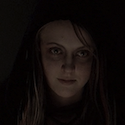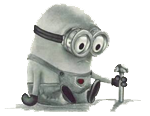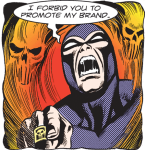|
Baron Bifford posted:I've read that modern day roboticists have enough difficulty teaching robots how to open doors and recognize faces. Imagine that robot was imbued with all the artificial humanity its creators had to offer but still struggled to interface with the world it was thrust into in some of the most basic ways possible. Might it feel... an intense desire to do that which it is unable? Basically 'A very clever engineer' could save 'hundreds of man-hours programming lust into an android' by' not give him a dick'.
|
|
|
|

|
| # ? Jun 9, 2024 10:58 |
|
NotJustANumber99 posted:Imagine that robot was imbued with all the artificial humanity its creators had to offer but still struggled to interface with the world it was thrust into in some of the most basic ways possible. Might it feel... an intense desire to do that which it is unable? It's not all that difficult. If they installed Windows 10 as the android's OS it'd start loving you right away.
|
|
|
|
NotJustANumber99 posted:Imagine that robot was imbued with all the artificial humanity its creators had to offer but still struggled to interface with the world it was thrust into in some of the most basic ways possible. Might it feel... an intense desire to do that which it is unable? Baron Bifford fucked around with this message at 05:19 on Nov 21, 2015 |
|
|
|
Baron Bifford posted:I don't know how they program AI in the future, but these days programmers must build everything from scratch. Everything that appears in code is deliberate and calculated and processes that seem simple and effortless to us are surprisingly difficult to implement in a machine. Emotions such as lust and insecurity and frustration are too complicated to be accidents. Try your hand at programming one day. It will transform your ideas on how the human mind works. Actually, a lot of modern AI behavior is learned. There's a large number of AI systems that use machine learning techniques that reproduce outputs without any explicit coding of a model for particular behaviors.
|
|
|
|
Sir Kodiak posted:Actually, a lot of modern AI behavior is learned. There's a large number of AI systems that use machine learning techniques that reproduce outputs without any explicit coding of a model for particular behaviors. Any examples of real-world applications of that? I went googling and came across this: https://www.youtube.com/watch?v=X_vKjYAa9gE, composed by Melomics. I dig it man. I dig.
|
|
|
|
Skizzzer posted:Any examples of real-world applications of that? Wikipedia: Unsupervised Learning quote:In machine learning, the problem of unsupervised learning is that of trying to find hidden structure in unlabeled data. Wikipedia: Artificial Neural Networks quote:In machine learning and cognitive science, artificial neural networks (ANNs) are a family of models inspired by biological neural networks (the central nervous systems of animals, in particular the brain) and are used to estimate or approximate functions that can depend on a large number of inputs and are generally unknown. Artificial neural networks are generally presented as systems of interconnected "neurons" which exchange messages between each other. The connections have numeric weights that can be tuned based on experience, making neural nets adaptive to inputs and capable of learning.
|
|
|
|
Man, thanks, but for a layperson on a Friday night those articles are not easy to read haha. Like something like this: quote:Memory Networks[52] is another extension to neural networks incorporating long-term memory which was developed by Facebook research. The long-term memory can be read and written to, with the goal of using it for prediction. These models have been applied in the context of question answering (QA) where the long-term memory effectively acts as a (dynamic) knowledge base, and the output is a textual response. should've said "this is how google answered with 'Harrisburg' when I asked 'what is the capital of pennsylvania.'" It does seem that artificial emotion or emotional AI is still not impressive. Nothing comes close to passing the Turing test, for example.
|
|
|
|
The book Starfish has a fun bit where the entire world is doomed by leaving a decision up to an artificial neural network. Basically there's an alternate form of life found in the ocean, that will infest and steal nutrients from all current life. So they leave the decision of how to deal with it to a gel (what they call the neural networks) But they didn't realize that this particular gel had come to "like" simple systems more than complex, so it plans on letting this other form of life take over. The author Peter Watts has it up on his website (and many other books under the creative commons license), I like his work, he's my favourite living scifi author, it's pretty tech heavy though, dude has a PhD in marine ecology or some such thing.
|
|
|
|
This isn't a fantastically written essay, but it seems like you basically grokked the subtext of Alien, at least, so congrats on that. 
|
|
|
|
What does "Grokked" actually mean?
|
|
|
|
Skizzzer posted:It does seem that artificial emotion or emotional AI is still not impressive. Nothing comes close to passing the Turing test, for example. Yeah, nobody can tell you how to make something like Ash because nobody knows how to do it. Other than, you know, the traditional human technique. The basic idea, though, is that formal techniques to break down human knowledge into defined, structured relationships – "a CAT is a TYPE of ANIMAL that DRINKS MILK" or whatever – end up being endless tasks of database entry that poorly match how humans interact with the world. So an alternative solution is, if you want to teach an AI to send human-like text messages, then feed the AI a database of recorded text message interactions and let it learn the patterns in how a message leads to a response. So, to your example of asking the capital of Pennsylvania, instead of creating a series of structures that breaks down what a state is, what a capital is, etc., the machine would instead derive on its own a statistical relationship between the words "capital," "Pennsylvania," and "Harrisburg," and through that learn that "Harrisburg" is the correct response to the query. But this means that an AI might learn that the statistically dominant response to, "Hey, thought you should know, I hooked up with your ex-girlfriend" is "What the gently caress, man?!" without anyone having to tell the AI that it should pretend to be offended. Basically, one theory on creating a machine with human-like behavior is to treat it less like writing an encyclopedia and more like raising a child. But then, much like with children, you run into the risk of it learning all sorts of things that you didn't necessarily want it to. Swearing, for instance, being a problem experienced in both domains. What you quoted, btw, about memory networks, is a technique built to help machines carry a conversation, to let the response to one statement incorporate information from previous statements. So that if one query you ask an AI to find a hotel in Cleveland, and in the next a nearby restaurant, it can leverage that "nearby" is dependent on the location of the hotel it determined earlier in the interaction. Not that this has anything to do with Alien, where Ash works the way he does because he's a commentary on humanity. Snowman_McK posted:What does "Grokked" actually mean? It has something to do with understanding something, but, yeah, it's not a word I've ever really gotten on a deep, intuitive level.
|
|
|
|
Baron Bifford posted:Try your hand at programming one day. I did a degree in Computer Science. Baron Bifford posted:Emotions such as lust and insecurity and frustration are too complicated to be accidents. They are only implementable as accidents. I am off to practice feeling frustrated.
|
|
|
|
Snowman_McK posted:What does "Grokked" actually mean? understand, comprehend, if it's Magic "understand intuitively"
|
|
|
|
Sir Kodiak posted:Actually, a lot of modern AI behavior is learned. There's a large number of AI systems that use machine learning techniques that reproduce outputs without any explicit coding of a model for particular behaviors.
|
|
|
|
Snowman_McK posted:What does "Grokked" actually mean? Looks like somebody never grokked Heinlein's hippie free love phase.
|
|
|
|
Skizzzer posted:It does seem that artificial emotion or emotional AI is still not impressive. Nothing comes close to passing the Turing test, for example. AI will never be impressive because our definition of AI is "exactly like a human". Even then, we are much more critical of a machine than we are of a fellow human. Example: you tell your friend something, they don't understand. You'll repeat yourself because hey it's normal. You tell your phone something, it doesn't understand, you'll get mad at it for not having perfect voice recognition.
|
|
|
|
McSpanky posted:Looks like somebody never grokked Heinlein's hippie free love phase. Because of Heinlein, I now grok cannibalism. TANSTAAFL.
|
|
|
|
https://www.youtube.com/watch?v=O462rVj6nXQ
|
|
|
|
Anybody but me here who thought for a moment that people are discussing Batman's butler?
|
|
|
|
Sir Kodiak posted:Yeah, nobody can tell you how to make something like Ash because nobody knows how to do it. Other than, you know, the traditional human technique. I figured that. I could hypothetically see us (humans) being able to build some physical facsimile of human in the future, but I was wondering how far along we are on the mind problem of AI. I guess I wasn't wondering so much about AI as I was about ROBOTS, aka Asimov style robots, Blade Runner, Ash and Bishop. Great sci-fi, if they involve AI, tend to use them as devices to comment on humanity (as you said already). wyoming posted:The book Starfish Nice, I need something to read for the holidays. computer parts posted:AI will never be impressive because our definition of AI is "exactly like a human". Even then, we are much more critical of a machine than we are of a fellow human. Isn't this called the AI effect or something?
|
|
|
|
Completely off topic, but every time I see the BATS tag in the corner of my eye, my mind processes it as Criterion's Throne of Blood cover.
|
|
|
|
I initially misread that as the BTAS tag and got briefly excited they changed the tag to that wonderful show. Was soundly disappointed
|
|
|
|
So Wonder Woman now has a logo.
|
|
|
|
Baron Bifford posted:So Wonder Woman now has a logo. if she presses it she can speak with captain mcmahon on the starship wrestleprise.
|
|
|
|
Baron Bifford posted:So Wonder Woman now has a logo. Looks like something a bird left on the hood of my car.
|
|
|
|
NuclearPotato posted:Looks like something a bird left on the hood of my car. You've got some cool birds.
|
|
|
|
MacheteZombie posted:You've got some cool birds. Or very bad eyes.
|
|
|
|
Two unrelated wrestling references in a row, this is the best thread.
|
|
|
|
Snowman_McK posted:Mark Millar veered into self parody a long time ago.
|
|
|
|
Hbomberguy posted:And he's far better for it. Nemesis is a masterpiece like an outsider art piece, a document from an alternate history where he went Actually Insane and kept writing comics. That felt like him going "Don't you loving get it? Power fantasies are just licenses to be assholes. Seriously, please get this."
|
|
|
|
I posted this in the comic book movie thread, but it's still worth reading again: Grant Morrison's take on BvS Superman as a return to the character's roots as an immigrant and a revolutionary force. http://www.forbes.com/sites/markhughes/2015/10/31/grant-morrison-talks-supermans-politics-arkham-asylum-movie-and-more/ quote:What’s your opinion of the new cinematic DCU? In particular, we see the approach with the previous film — and now more so with the new film Batman v Superman: Dawn of Justice — addressing the social issues surrounding the arrival of Superman, including reflecting real-life xenophobia and anti-immigrant sentiments in the U.S. these days. And then there’s the idea of America as a beacon of hope that can use its power for good, but also this fear so many people have of the danger from potential abuse of that vast power.
|
|
|
|
I really like Nemesis simply because in combination with being a comic, it's an invitation to watch Mark Millar write it. Like a good comedy film where it's like you're there watching the actors themselves have fun. I don't think I've had a similar comic experience. It's not 'good' but that's really not, for me, how comics have to be. I'm pretentious as poo poo though. The afterward is Millar saying 'yeah i'm crazy and going to spend the profits from this on a dick pump. See ya!' Speaking of pretentious, long-rear end essay incoming
|
|
|
|
Hbomberguy posted:I really like Nemesis simply because in combination with being a comic, it's an invitation to watch Mark Millar write it. Like a good comedy film where it's like you're there watching the actors themselves have fun. I don't think I've had a similar comic experience. It's not 'good' but that's really not, for me, how comics have to be. I'm pretentious as poo poo though. I look forward to it. Do you have your take on "The Raid 2" handy? That was a cool read.
|
|
|
|
I don't think I wrote about The Raid 2 much in the past. I wrote about Gremlins 2, though, if that's what you meant? In any case: Jack, Jill, Class Disparity and the State of the Modern Progressive Western Identity. By Harris Bomberguy A question that faces us in the world today is the problem of society – infinitesimal cultural differences threaten to explode and render us enemies to one another. Our histories offer a laundry list of offenses each group has committed against the other, and social antagonism remains despite the best efforts of ‘political correctness’ and ‘charity’. Jack and Jill is a comedy in the tradition of Oscar Wilde’s The Importance of Being Earnest, a socialist tale which interrogates the idea of class roles and social obligations, in which characters create elaborate personae in order to escape from what is expected of them. Protagonist Jack is a successful commercial producer. His every act is an attempt to be what is expected from a participant in western capitalism – he is charitable to the poor, giving a homeless man a place to stay and eat for thanksgiving, he adopted an Indian boy at a very young age, and he is Jewish but doesn’t bring it up around others, trying not to be forceful with it. Simultaneously, however, Jack is incredibly defensive of his heritage – joking about, or even mentioning Judaism deeply offends him. In other words, Jack maintains his rich Californian persona by ensuring that no-one can engage with him on any level other than as the upper-middle-class progressive, charitable and all-American white male with a diverse family. The film is very quick to undermine his attempts to seem genuine by flooding the frame with product placement at every given opportunity.    The message is not that Jack is free, having attained an air of transcendant cultural neutrality, but that he is corrupted, totally saturated with corporate logos and imagery. He spends the entire run of the film acting at the beck and call of Dunkin Donuts in an attempt to get them to pay him for a commercial. His attempts at freedom and goodness ultimately ensure that little changes in society as a whole – the homeless remain homeless, and corporate logos are everywhere and going to spread even further, with Jack as their willing stooge. What terrifies Jack more than anything is Jill, who is coded to be a reflection of all of Jack's own repressed components. She embarasses him precisely because she knows him too well, all of his closely-guarded secrets and behaviours, treating him without the level of polite upper-middle-class finery he uses to distinguish himself. Furthermore, her behaviour embodies numerous old-Jewish stereotypes, which Jack has obviously tried very hard to erase from his own identity in order to fit in with 'polite' society. She is anathema to him not because she is 'annoying', but because she reminds him of who he used to be, and his society has made him hate that old self. In other words, Jack and Jill make up opposite ends of the classic Hegelian dialectic - where the two appear to be opposites, the truth is that one is simply another's latent aspects. This is reflected in how Jill is also played by Adam Sandler in makeup. They are quite literally the same person in different forms. Jill herself recognises their similarities and Jack’s bizarre beahaviour, asking ‘Why are you so afraid to admit that we are connected?’ and pointing out that he ‘likes to pretend his life started in California.’ Jack attempts to keep Jill at a ‘safe’ distance by abandoning her, declaring she can ‘skype us any time [she] want[s]’. Jill says that Skype ‘sounds anti-semetic’, and in a very direct way she is right – she has recognised Jack is trying to keep the proof of his low-class Jewish roots away from him. Jill’s class signifiers are myriad. Along with her being from a poorer area and speaking with a Bronx accent, she spends several nights sleeping in the woods right next to the homeless person Jack had over for one night.  This makes her comments about her and Jack being ‘connected’ all the more prescient – Jack and Jill represent high and low society, and the two are ultimately the same. Class disparity is an artificial imposition that divides people needlessly and masks the real problem. Where do the homeless sleep when the rich aren’t feeling charitable? Why are they homeless? Why, in a world of luxurious cruise-liners and multimillion-dollar Al Pacino donut commercials, has poverty not been abolished entirely? Jack’s version of American society, where people are simply occasionally nice to those without power, and the world is sodden with Coca-Cola logos and pepto-bismol bottles, is shown to be sorely lacking. We are told quite explicitly that Jack’s wife converted to Judaism, though she insists she 'wasn’t forced'. Incidentally, in another scene, Jack refuses to make his wife ‘wear something trashy’, then looks expectantly at her, and asks ‘unless she wants to.’ The message, of course, is that he expects the very desires of others to bend to his whims. Beneath the facade of the peaceful, ‘free to do what you want’ modern American identity lies the threatening corollary: ‘...as long as it’s what I want you to want’. Jack’s lucrative advertising career, a field that specialises in manipulating people’s intentions and desires, invalidates the idea that real freedom exists at all in his world. When a customer sees a commercial and decides they want a coke, did they really want it - or was this desire implanted? At a party, where many of Jack’s friends and co-workers are gathered together, upon learning that one among them is an atheist, one partygoer declares he is about to ‘open his skull’, and a fight is only prevented by the emergence of the birthday cake. This is a frighteningly direct representation of real-life American culture: A false 'melting pot', threatening at any point to erupt into violence as the facade of wholeness continues to crack, maintained only by hasty celebrations and other acts of ‘maintaining peace’. Again, the message is clear – rather than being a nation full of different people acting as they would prefer, there is simply ‘a norm’ to which people are expected to adhere. You can be an atheist, but you can’t bring it up, and you’d better not bring anyone else beliefs up either. Everyone maintains a distance to defend themselves, and when that distance is threatened, violence emerges. There is an alternative society, offered by Al Pacino. Because they are both from the Bronx, Al assumes of Jill all stereotypical traits of a Bronxer – declaring that she must know how to play stickball, as it is ‘in her DNA’.  In this shot, Pacino appears as a manipulative force, telling Jill who she is, exerting control over her own identity. This version of freedom is equally terrifying as Jack’s. While you are allowed to be different from others, you are given a set of assumed traits that are ‘natural’ to you, given your ethnicity or background or gender. Pacino is attracted not to her, but to what he assumes of her given where she comes from. It is a very American sort of classism. Notably, in the same scene Pacino speaks vaguely-french-sounding gibberish at his french Chef with the assumption that he will understand him. Later, Pacino sees a sweat-stain left by Jill:  And attempts to ‘fit’ into it.  This is a perfectly fitting visual for his character – he believes people have a ‘shape’, ascribed by their upbringing or place of birth, and that they should conform to this shape. It’s not an accident that these ideas were given to the character who is literally a method actor, dedicated to finding the best way to play Don Quixote. Pacino says of Jill ‘when I look at her, I see me. I see what I was. I’m lost.’ Society has made Pacino believe he is ‘lost’, and to 'find' himself he must find an ideal partner who 'completes' him. It’s a joke about conceptions of modern relationships. Jill is an ideal to him, rather than a person. This ideal, however, is clearly unattainable – she is nothing like him or his ideal fellow Bronx-ite. These ideals never really existed beyond popculture and Jack's commercials. Pacino’s part of the story takes another turn when Jack pretends to be Jill in order to get what he wants. Pacino is easily fooled because ‘the real Jill’ was never really what interested him. This film offers quite possibly the best, most direct representation of modern ideology. A man, engaged in a foolish search for a nonexistent ideal partner (one all of society has convinced him must exist), can only finally find her in the form of another man who wishes to profit from his search. He even remarks ‘there’s something different about you. You look more feminine.’ When he encounters Jack's Jill disguise. Eventually, Jill meets Felipe, a Mexican landscaper who does Jack’s garden, and he offers a third alternative. He immediately, simply to be friendly to someone who seems down, invites her to his family’s picnic: “We play soccer, eat, steal white people’s wallets...” “What?” “I’m kidding. We don’t eat!” Felipe is of course joking about stereotypes about Mexicans – but in the context of the other two societies, this is a radical option. Felipe, aware of how culture has painted him, has allowed it to remain externalised and joke about it while going about his own business as he wishes. Felipe has a culture that is his own, but is capable of laughing at it and at others for their stupid stereotypes, all while inviting others to join him in his own enjoyment. Jill is not expected to be good at soccer, but invited to partake anyway. More importantly, while she starts out terrible at the sport, she gets better at it.In the other two conceptions of society, she is expected to act one way as a courtesy, or assumed to be good at some specific things automatically. In Felipe’s society, identity is truly fluid. A person can grow, and change, and be a collection of different things. When asked if he is a gardener, Felipe responds, ‘No...I don’t just do gardening.’ This echoes, if anything, Karl Marx: "in communist society, where nobody has one exclusive sphere of activity but each can become accomplished in any branch he wishes, society regulates the general production and thus makes it possible for me to do one thing today and another tomorrow, to hunt in the morning, fish in the afternoon, rear cattle in the evening, criticise after dinner, just as I have a mind, without ever becoming hunter, fisherman, herdsman or critic. This fixation of social activity, this consolidation of what we ourselves produce into an objective power above us, growing out of our control, thwarting our expectations, bringing to naught our calculations, is one of the chief factors in historical development up till now." Karl Marx, The German Ideology Identity, to Felipe, is something upon which you are permanently free to decide, and is not set in stone. At the climax of the film, Felipe declares his love for Jill, and Jill asks him to convert to Judaism. He is surprised – but she exclaims ‘I’m kidding!’ and they laugh. Having gained a cynical distance from her identity, the film ends with the first genuine relationship of the story. Jill doesn’t expect her lover to be completely like her – in contrast with her brother, whose wife had to convert. Jack and Jill’s message is a positively utopian vision of the future – neither one where all cultural stereotypes and signifiers are erased and forcibly hidden in the self-destructive search for a homogenous purity in order to better interface with corporate capitalism, nor one where people are putridly expected to act out their birth-culture and act like their class or circumstances befit them, but one where these things are rendered totally abstract and apart from us, leaving us free to mock and question all histories and cultures, then live as we please in peace with one another. The film takes Slavoj Zizek's stance on racism, that it can be properly confronted and destroyed not with political correctness, keeping others at a distance where they cannot question you too much, but with progressive racism: “There is a way to practice racist jokes where they become no longer racist. All the time, in ex-Yugoslavia, we all the time exchanged dirty jokes about one and the other nation. But this didn’t function as racist, but as a shared obscenity. Which meant a way of solidarity – like I remember, I meet a Montenegran, and we immediately start to share dirty jokes about the other and about ourselves...the message was that we are not these cold, politically correct ‘oh, what nice food you have, nice ethnic dances’ – I don’t care about your stupid dances, I want dirty jokes!...It is shared solidarity.” Slavoj Zizek, ‘On Racism’ Jack and Jill identifies that everything about our nature, all our differences, everything, is window dressing, and humans can be anything. The film sides with those who are capable at laughing at the old instruments of identity, in order to throw them aside and truly lives as authentic humans. Hbomberguy fucked around with this message at 21:46 on Nov 24, 2015 |
|
|
|
U rly think all that about Jack & Jill or u thought it'd be a more interesting essay if u took that viewpoint? Just wonderin, good essay!!
|
|
|
|
The film can be read the way I am reading it here (as in fact all films can) but that doesn't actually make it entertaining or funny or worth watching. I would argue that Sandler's films, in being mostly garbage unmoderated by delusions of quality, are actually the most direct in the ideological problems inherent to the society that made them. They don't dress it up.
|
|
|
|
Hbomberguy posted:In any case: Thanks for this, I really appreciate it! The writing starts out pretty drat wobbly, but you had me completely on board by the time you started diving into Jill's character. I think it's especially interesting to consider your ideological critique in the context of my own reading of Anger Management, with Buznik and Jack as analogous figures of self-denial and self-destruction in the form of late-capitalist politeness, as well as Rydell and Pacino as analogous figures of performative identity and demand for an archetypally pure self. The key difference being that while Anger Management shows us little if anything beyond these two completely insufficient worldviews, Jack and Jill has enough sense to widen the lens and show us what exists beyond this false dichotomy.
|
|
|
|
Thanks for the response. I started writing it mostly as notes before going back to check the film, so I probably repeat myself more than I should and hadn't narrowed the earlier parts down to the central point by the time of the end. I haven't written a real essay of that length in like two years, oh my god. But yeah it's nice that the story provides an alternative - a lot of films, such as the star wars prequels, offer signs of what direction to take but don't actually give a genuine option in-film. You really just have to accept that the real protagonist is Jill, and Jack is just the focal character. Hbomberguy fucked around with this message at 00:42 on Nov 25, 2015 |
|
|
|
I've decided to do an essay on the political themes of Superman through the ages. I'm right now researching the radio serial episode where Superman fights the Ku Klux Klan (the episode having been written using intelligence supplied by Stetson Kennedy). How strong was the Ku Klux Klan in the late 1940s? They were a shadow of their former self, but were they still a formidable political force? At the time, could you still admit your support for the Klan in polite society?
|
|
|
|

|
| # ? Jun 9, 2024 10:58 |
|
Baron Bifford posted:I've decided to do an essay on the political themes of Superman through the ages. I'm right now researching the radio serial episode where Superman fights the Ku Klux Klan (the episode having been written using intelligence supplied by Stetson Kennedy). How strong was the Ku Klux Klan in the late 1940s? They were a shadow of their former self, but were they still a formidable political force? At the time, could you still admit your support for the Klan in polite society? AahahahahahahahahahahahahAHAHAHAHAHAHAHAHAHA Shadow of their former self? Oh no. No, no, no. They were rapidly becoming more powerful than ever before and there were many politicians openly members and supporters. Superman is basically who you have to thank for the KKK becoming the joke it is today. Take that every other super hero.
|
|
|






























